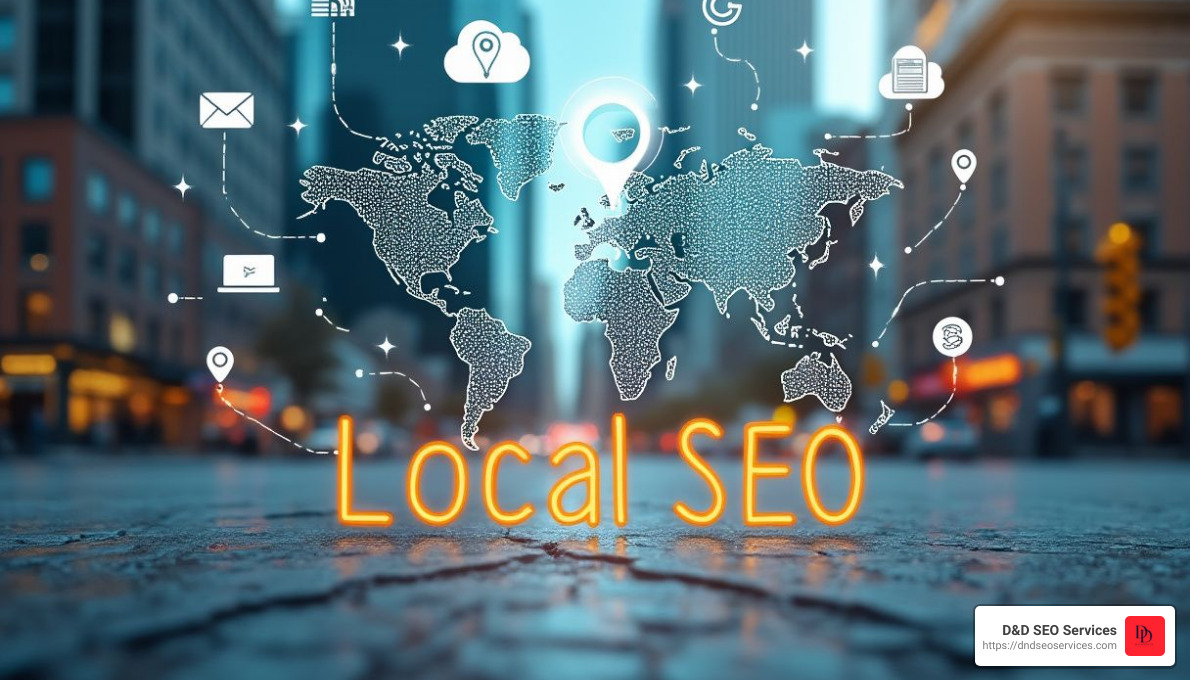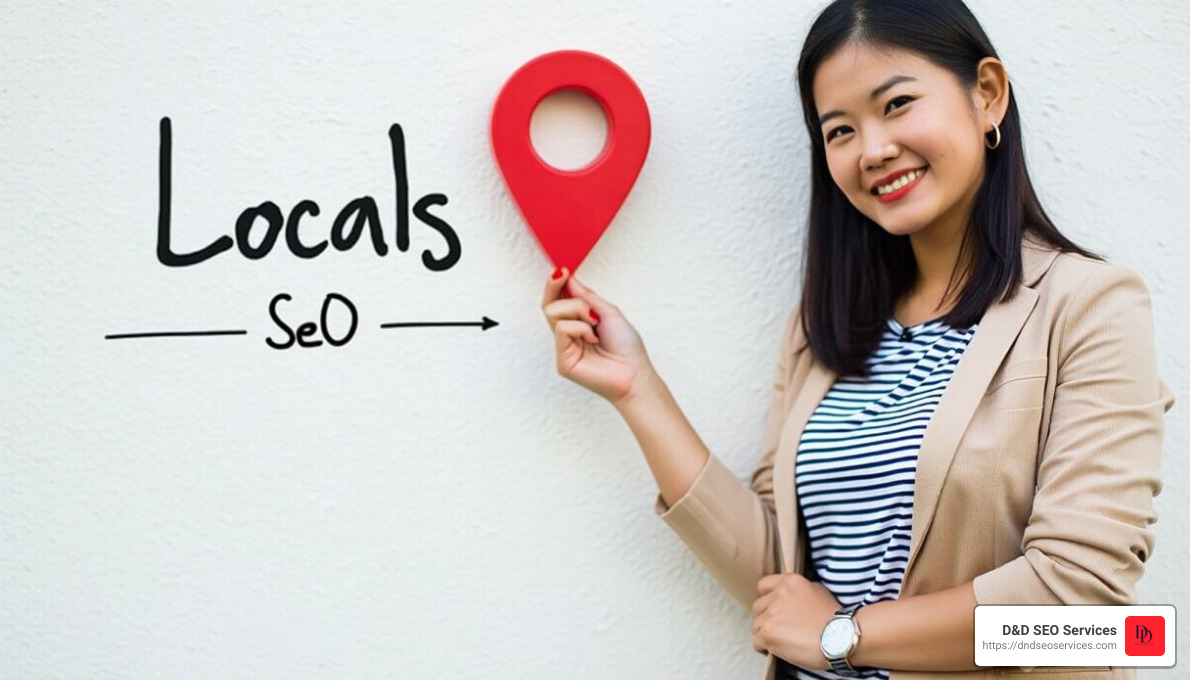Why Local SEO is Essential for Your Business
Local SEO Ranking Factors are the key elements that search engines like Google look at when deciding the order of local business results. These factors greatly influence who shows up in those coveted top spots in search results. If you’re looking for a quick summary of these factors, here they are:
- Relevance: How closely your business matches the search intent.
- Distance: How close your business is to the searcher.
- Prominence: How well-known your business is online.
Understanding and optimizing for these factors can make a massive difference. Recent statistics show that 76% of consumers who search for something local on their phone visit a store that same day. So, investing in local SEO not only gets your business noticed but can also drive immediate foot traffic and increase sales.
Here’s what we’ll cover to boost your local search rankings:
- Google Business Profile optimization
- Getting and managing online reviews
- On-page SEO tactics
- Consistency in local citations
- Building quality backlinks
- Behavioral and personalization factors
Optimizing these factors can help your business show up when and where potential customers are looking for services you offer.
Google Business Profile Factors
Business Title
Your business title is more than just a name; it’s a key factor in local SEO. Including relevant keywords in your business title can significantly boost your rankings. For example, if someone searches for “electric cars San Rafael,” a business named San Rafael Electric Car Mart is likely to rank higher than Jim’s Auto Lot. Make sure your business title accurately reflects what you offer and includes location-specific keywords.
Categories
Selecting the right categories for your Google Business Profile (GBP) is crucial. Google allows you to choose up to ten categories. The more specific and relevant your categories, the better your chances of appearing in relevant searches. For instance, if you offer electric vehicle services, selecting “electric vehicle charging station” will make you more visible to those looking for EV charging points, compared to a generic “gas station” category.
Website URL
Linking to a strong, authoritative page on your website can improve your GBP ranking. If your homepage has accrued many backlinks and high authority, link your GBP to it rather than an obscure subpage. A strong website connection signals to Google that your business is credible and relevant.
Photos
Visual content can significantly impact user engagement and, indirectly, your local SEO. High-quality photos of your business, products, and services can make your profile more appealing. Regularly update your photos to keep your profile fresh and engaging. Google tends to favor listings with active and current visual content.
Posts
Google Posts allow you to share updates, offers, and events directly on your GBP. Regular posts can keep your audience engaged and informed. They also show Google that your business is active, which can positively impact your ranking. Make sure to include relevant keywords and a call-to-action in your posts.
Q&A
The Q&A section on your GBP is a valuable tool for addressing common customer queries. By proactively adding and answering questions, you can provide helpful information and improve your profile’s relevance. This section can also help you manage customer expectations and reduce the number of repetitive inquiries.
Bookings
If your business accepts appointments or reservations, enabling the booking feature on your GBP can streamline the process for customers. This convenience can lead to higher engagement and better reviews, which in turn can boost your local SEO.
Messaging
Google’s messaging feature allows potential customers to contact you directly through your GBP. Quick and helpful responses can improve customer satisfaction and engagement. High engagement rates signal to Google that your business is relevant and trustworthy.
Hours of Operation
Accurate and up-to-date hours of operation are essential. Incorrect hours can lead to negative reviews and reduced customer trust. Make sure to update your hours during holidays or special events to avoid any inconvenience for your customers.
Popular Times
Google provides insights into the busiest times for your business. This feature helps customers plan their visits and can improve their overall experience. While you can’t directly control this factor, understanding it can help you manage staff and resources more effectively.
Optimizing your Google Business Profile by focusing on these factors can significantly improve your local SEO ranking. Next, let’s dive into how reviews can impact your local search visibility.
Review Factors
Reviews play a crucial role in Local SEO Ranking Factors, helping to build trust and credibility for your business. Google pays close attention to several types of reviews and their nuances. Let’s break down the key elements:
Google-based Reviews
These are reviews and star ratings left directly on your Google Business Profile (GBP). They are perhaps the most influential type of review for local SEO. Google-based reviews are prominently displayed in search results, making them highly visible to potential customers.
- Recency: Fresh reviews are more impactful. Google favors businesses with recent feedback, signaling to users that your business is active and relevant.
- Velocity: The frequency at which you receive new reviews also matters. A steady stream of reviews indicates ongoing customer engagement.
- Authority: Reviews from recognized contributors, like Google’s Local Guides, may carry more weight than reviews from first-time users.
Third-Party Review Sites
Reviews on platforms like Yelp and industry-specific sites (e.g., Zagat for restaurants) can also influence your local SEO. Google considers these reviews when ranking your business.
- Diversity: Having reviews across multiple platforms can improve your credibility. It shows that your reputation is well-rounded and not confined to a single site.
- Authority: Reviews from reputable third-party sites can lend additional credibility. For example, a glowing review on Yelp can reinforce positive perceptions.
First-Party Reviews on Your Website
These are reviews you collect and display on your own website. While they may not be as influential as Google-based or third-party reviews, they still play a role.
- Format: Text-based reviews are generally more impactful than star ratings alone. Detailed feedback provides more context and helps build trust.
- Integration: Displaying first-party reviews prominently on your site can keep visitors engaged and improve dwell time, indirectly benefiting your SEO.
Recency
Are your reviews recent or outdated? Google prefers up-to-date feedback, as it reflects the current customer experience. Encourage satisfied customers to leave reviews soon after their interaction with your business.
Velocity
How frequently are you receiving new reviews? A steady influx of reviews signals ongoing customer engagement and satisfaction, which Google views positively.
Diversity
Do you have reviews on multiple platforms? The more diverse your review sources, the more credible your business appears. Aim to garner reviews on Google, Yelp, and industry-specific sites.
Authority
Could a review from a professional reviewer or a Google Local Guide carry more weight? Absolutely. Reviews from authoritative sources can significantly boost your credibility and ranking.
Format
Do text-based reviews have more impact than textless star ratings? Yes. Detailed reviews provide more context and help potential customers make informed decisions. Encourage customers to leave detailed feedback.
Pro Tip: Responding to reviews—both positive and negative—shows that you value customer feedback and are committed to improving their experience. This can improve your online reputation and potentially improve your rankings.
Next, let’s explore the on-page factors that can further optimize your local SEO strategy.
On-page Factors
On-page factors are the elements on your website that help search engines understand what your business is about. These factors are crucial for both local and organic search rankings. Let’s break down the key components:
Domain Authority
Domain Authority (DA) is a score developed by Moz that predicts how well a website will rank on search engine result pages (SERPs). The higher your DA, the more likely your site is to rank well.
- How to Improve DA: Building high-quality backlinks, publishing valuable content, and ensuring a strong technical foundation can help increase your DA.
Page Authority
Page Authority (PA) measures the strength of individual pages on your website. Like DA, a higher PA means a better chance of ranking well.
- How to Improve PA: Focus on creating high-quality, relevant content and earning backlinks to specific pages.
NAP (Name, Address, Phone Number)
Your NAP should be consistent across your website and all other online platforms. This consistency helps search engines verify your business information.
- Visibility: Make sure your NAP is prominently displayed on your website, ideally in the footer and on a dedicated contact page.
- Consistency: Ensure your NAP matches exactly with what’s listed on your Google Business Profile and other directories.
Optimization
Optimization involves tailoring your website content, tags, and internal links to reflect the keywords your potential customers are searching for.
- Keyword Usage: Use relevant keywords naturally in your titles, headings, and body content. For example, if you’re an EV dealer, you might target phrases like “electric vehicle prices.”
- Internal Linking: Link related content within your site to help search engines understand the relationship between different pages.
Quality
High-quality content is essential for ranking well. Google favors content that is authoritative, well-written, and free from errors.
- Authoritative Content: Publish in-depth articles that provide real value to your visitors.
- Error-Free: Make sure your content is free from spelling and grammatical errors.
Technical and Security Factors
Technical and security factors ensure that your website is accessible, secure, and easy for search engines to crawl and index.
- Mobile-Friendly: Your site should be optimized for mobile devices. Google uses mobile-first indexing, so a mobile-friendly design is crucial.
- Secure: Use HTTPS to ensure your site is secure. Google favors secure sites and it helps build trust with your visitors.
- Proper Configuration: Ensure your robots.txt file and page redirects are correctly set up so search engines can easily crawl and index your site.
- Speed: A fast-loading site improves user experience and can positively impact your rankings.
Pro Tip: Use tools like Google’s PageSpeed Insights and Moz’s Web Developer’s SEO Cheat Sheet to identify and fix technical issues that could be hurting your rankings.
Next, let’s dive into citation factors that can further improve your local SEO strategy.
Citation Factors
Citations are mentions of your business’s name, address, and phone number (NAP) on other websites. They play a crucial role in local SEO ranking factors. Let’s explore the key aspects:
Accuracy
Accuracy is essential for citations. Your NAP information must be consistent and correct across all platforms.
- Why It Matters: Inconsistent or incorrect information can confuse customers and search engines, leading to lower rankings.
- How to Ensure Accuracy: Regularly audit your citations to ensure all information matches your website and Google Business Profile.
Distribution
Distribution refers to the number of platforms where your business is listed.
- Why It Matters: The more places your business is cited, the more likely search engines will consider it authoritative and relevant.
- How to Increase Distribution: List your business on a variety of directories, including local business directories, industry-specific sites, and general platforms like Yelp and Yellow Pages.
Quality
Quality of the platforms that list your business also matters.
- Why It Matters: Citations from authoritative and high-quality sites carry more weight than those from low-quality or spammy sites.
- How to Ensure Quality: Focus on getting listed on well-regarded directories and websites that are relevant to your industry or locality.
Relevance
Relevance of the platforms citing your business is important for local SEO.
- Why It Matters: Citations from websites relevant to your industry or geographic area are more valuable.
- How to Ensure Relevance: Seek out directories and websites that are specific to your industry or local area. For example, an EV charging station should be listed on green energy and automotive sites.
Structured Citations
Structured Citations are listings on business directories and social media profiles where your NAP information is displayed in a structured format.
- Examples: Google My Business, Yelp, Facebook.
- Why It Matters: These citations are easier for search engines to find and verify.
- How to Get Structured Citations: Create and maintain profiles on major directories and social media platforms, ensuring your NAP information is accurate and up-to-date.
Unstructured Citations
Unstructured Citations are mentions of your business in blogs, news articles, or other content where your NAP information isn’t formatted as a listing.
- Examples: A local newspaper article mentioning your business or a blog post reviewing your services.
- Why It Matters: These citations can still boost your SEO by providing additional context and authority.
- How to Get Unstructured Citations: Engage in local community events, press releases, and content marketing to increase the chances of being mentioned in relevant content.
Ensuring your citations are accurate, widely distributed, high-quality, and relevant can significantly boost your local SEO efforts. Next, let’s explore the importance of link factors in enhancing your local search rankings.
Link Factors
Links are crucial for both local and organic search rankings. They come in two main types: internal links and inbound links. Let’s break down the key aspects:
Internal Links
Internal links connect different pages within your website.
- Why It Matters: They help search engines understand the structure of your site and the relationship between different pages.
- How to Optimize: Use descriptive anchor text and ensure links lead to relevant, high-quality content. For example, a page about electric vehicle charging rates could link to a page about the locations of your charging stations.
Inbound Links
Inbound links are links from other websites pointing to your site.
- Why It Matters: They signal to search engines that your site is authoritative and trustworthy. Inbound links can significantly boost your rankings.
- How to Earn Inbound Links: Reach out to local businesses, participate in community events, and create valuable content that others want to link to.
Domain Authority
Domain Authority (DA) measures the overall strength of your website.
- Why It Matters: Higher DA means your site is more likely to rank well in search results.
- How to Improve DA: Focus on earning high-quality inbound links and creating valuable, shareable content.
Page Authority
Page Authority (PA) is similar to DA but focuses on the strength of individual pages.
- Why It Matters: High PA pages are more likely to rank well for specific keywords.
- How to Boost PA: Optimize individual pages with high-quality content and earn inbound links to those specific pages.
Quantity
Quantity refers to the number of inbound links your site has.
- Why It Matters: More links generally mean higher rankings, but quality is still more important than sheer quantity.
- How to Increase Quantity: Engage in link-building strategies like guest blogging, partnerships, and community involvement.
Relevance
Relevance of the linking site to your business is crucial.
- Why It Matters: Links from relevant sites carry more weight. For example, an EV charging station should seek links from green energy blogs or automotive sites.
- How to Ensure Relevance: Target websites and directories that are relevant to your industry or locality.
Diversity
Diversity of linking domains is also important.
- Why It Matters: Links from a variety of sources signal to search engines that your site is widely recognized and reputable.
- How to Achieve Diversity: Aim to earn links from different types of sites, such as blogs, news articles, local business directories, and industry-specific sites.
Link Anchor Text
Link Anchor Text is the clickable text in a hyperlink.
- Why It Matters: Descriptive anchor text helps search engines understand the context of the linked page. For example, “award-winning EV charging station in San Francisco” is better than “click here.”
- How to Optimize Anchor Text: Use relevant keywords and make sure the anchor text accurately describes the linked page.
Mastering these link factors can significantly boost your local SEO efforts. Next, let’s dig into the behavioral factors that impact your local search rankings.
Behavioral Factors
Behavioral factors are all about how users interact with your online presence. These actions can significantly impact your local SEO rankings. Let’s explore the key behavioral factors you need to know:
Click-Through Rate (CTR)
Click-Through Rate (CTR) measures how often people click on your listing when it appears in search results.
- Why It Matters: A high CTR signals to Google that your listing is relevant and valuable to users.
- How to Improve CTR: Use compelling titles and meta descriptions. For instance, include keywords and a clear call-to-action like “Find the Best EV Charging Stations Near You.”
Dwell Time
Dwell Time is the amount of time a user spends on your page after clicking through.
- Why It Matters: Longer dwell times indicate that users find your content useful, which can boost your rankings.
- How to Increase Dwell Time: Create engaging, high-quality content. Use videos, images, and easy-to-read text to keep users on your page longer.
Clicks-to-Call
Clicks-to-Call measures how many users click the “call” button on your listing to phone you.
- Why It Matters: High click-to-call rates suggest that users are highly engaged and interested in your business.
- How to Encourage Clicks-to-Call: Make sure your phone number is easy to find and consider adding a call-to-action like “Call Now for Special Offers.”
Clicks-for-Directions
Clicks-for-Directions tracks how many people click the “directions” button to get driving directions to your location.
- Why It Matters: This indicates strong local interest and intent to visit your business.
- How to Boost Clicks-for-Directions: Ensure your address is accurate and up-to-date. Adding a map and clear directions on your website can also help.
Clicks-to-Site
Clicks-to-Site measures how many users click through from your listing to your website.
- Why It Matters: More clicks to your site can lead to higher engagement and conversions.
- How to Increase Clicks-to-Site: Use a compelling website link and enticing descriptions. Highlight unique selling points like “Visit Our Site for Exclusive Deals on EV Charging.”
Behavioral factors offer valuable insights into how users interact with your business online. Improving these metrics can lead to better local SEO rankings and more customer engagement.
Next, let’s discuss how personalization factors, like searcher location, play a role in local SEO.
Personalization Factors
When it comes to Local SEO Ranking Factors, personalization plays a key role. This section will focus on how searcher location, user-to-business proximity, and distance impact your local SEO.
Searcher Location
Searcher location refers to where the user’s device is physically located when they perform a search. This is one of the most significant personalization factors in local SEO.
- Why It Matters: Google uses the searcher’s location to deliver the most relevant local results. For example, if someone searches for “coffee shop,” Google will show coffee shops nearby.
- Real-World Example: Imagine you’re in downtown Chicago searching for a “pizza restaurant.” Google will prioritize showing pizza places near your current location rather than those across the city.
User-to-Business Proximity
User-to-business proximity is all about how close the searcher is to your business at the time of the search.
- Why It Matters: The closer a user is to your business, the more likely Google is to show your business in search results. This phenomenon is easy to observe. Walk around your town and search for the same term from different locations; you’ll see the results change based on your proximity.
- Tip: While you can’t control where your customers are located, you can ensure your Google Business Profile is optimized to attract those who are nearby.
Distance
Distance is closely related to user-to-business proximity but focuses more on the actual physical distance between the searcher and your business.
- Why It Matters: If a user is searching for a service that involves visiting a physical location, businesses closer to the user will typically rank higher.
- Example: If your competitor’s EV dealership is on High Street and a potential customer is also on High Street, your competitor will naturally have an advantage due to their closer distance to the searcher.
What You Can Do
While you can’t change the location of your business, there are steps you can take to make the most of these personalization factors:
- Optimize Your Google Business Profile: Ensure all your information is accurate and up-to-date. This includes your address, phone number, and business hours.
- Encourage Local Reviews: Positive reviews from local customers can boost your visibility in nearby searches.
- Local Content: Create content that is relevant to your local community. This can include blog posts about local events, partnerships with other local businesses, or highlighting local customer stories.
Understanding these Local SEO Ranking Factors can help you tailor your strategy to attract more local customers. Next, we’ll dive into the negative factors that can impact your local SEO rankings.
Negative Factors
When aiming for top local SEO rankings, it’s crucial to avoid certain pitfalls that can harm your standing. Let’s explore the negative factors that can impact your local SEO rankings, including Google Business Profile violations, review violations, on-page issues, citation inaccuracies, spammy link building, and poor behavioral signals.
Google Business Profile Violations
Violating Google’s guidelines for your business profile can severely damage your local SEO efforts. Here’s what to watch out for:
- Ineligible Listings: Do not create listings for locations where your business doesn’t physically exist. Fake locations can lead to listing removal.
- Keyword Stuffing: Avoid stuffing the business title with keywords. Stick to your official business name.
- Example: A local bakery named “Sweet Treats” listing itself as “Best Cakes Sweet Treats Bakery” could face penalties for keyword stuffing.
Review Violations
Your approach to gathering and managing reviews can also impact your rankings:
- Paid or Incentivized Reviews: Offering incentives for reviews is against Google’s guidelines and can result in review removal or listing penalties.
- Fake Reviews: Posting reviews on behalf of others or hiring third parties to do so can lead to severe consequences, including litigation.
- Case Study: A restaurant that paid for positive reviews saw their ratings plummet when Google detected the violation and removed the fraudulent reviews.
On-Page Issues
On-page SEO is critical, but certain mistakes can hurt your local SEO performance:
- Hacked Websites: Sites compromised by malware or hackers will struggle to rank.
- Poor Optimization: Over-optimization or lack of optimization can both negatively affect rankings. Aim for balanced, quality content.
- Technical Problems: Issues like slow loading times, broken links, or lack of HTTPS can also be detrimental.
Citation Inaccuracies
Citations are powerful, but inaccuracies can lead to confusion and lower rankings:
- Inconsistent NAP (Name, Address, Phone Number): Ensure your business information is consistent across all platforms.
- Duplicate Listings: Multiple listings for the same location can confuse search engines and users.
- Example: A local gym with different phone numbers listed on Yelp and Google can frustrate potential customers and harm SEO.
Spammy Link Building
Link building is vital, but engaging in spammy practices can backfire:
- Buying Links: Purchasing links violates Google’s guidelines and can result in penalties.
- Link Farms: Participating in link farms or unnatural link exchanges can erode your site’s credibility.
- Tip: Focus on earning high-quality, relevant links instead of taking shortcuts.
Poor Behavioral Signals
User engagement signals are crucial for ranking, and neglecting them can hurt your SEO:
- Low Click-Through Rate (CTR): If users aren’t clicking on your listings, Google may deem them irrelevant.
- Short Dwell Time: Users leaving your site quickly can indicate poor content quality.
- Example: A local retailer with a high bounce rate might struggle to rank if users aren’t engaging with their site.
By avoiding these negative factors, you can significantly improve your local SEO performance and avoid common pitfalls that many businesses face. Next, we’ll answer some frequently asked questions about local SEO ranking factors.
Frequently Asked Questions about Local SEO Ranking Factors
What are the key ranking factors in local SEO?
Local SEO ranking factors are elements that influence how a business appears in local search results. Here are the key factors:
- Google Business Profile: Your business title, categories, website URL, and other details on your profile are crucial. For example, a business named “San Rafael Electric Car Mart” with the category “electric vehicle charging station” is more likely to rank higher for relevant searches.
- Reviews: Google-based reviews, third-party reviews, and first-party reviews all matter. The recency, velocity, diversity, authority, and format of these reviews can impact your ranking.
- On-page SEO: This includes domain authority, page authority, NAP (Name, Address, Phone Number) consistency, content quality, and technical factors like site speed and security.
- Citations: Accurate and consistent mentions of your business across the web. These can be structured (business directories) or unstructured (mentions in blog posts).
- Links: Both internal links within your site and inbound links from other sites. The quantity, quality, relevance, and diversity of these links are important.
- Behavioral Factors: How users interact with your site and listings, including click-through rates (CTR), dwell time, and actions like clicks-to-call or clicks-for-directions.
- Personalization Factors: Searcher location and proximity to your business. Google personalizes results based on the user’s location.
How do reviews impact local SEO rankings?
Reviews are a critical component of local SEO. Here’s how they impact rankings:
- Google-based Reviews: These are reviews left directly on your Google Business Profile. They are highly influential.
- Third-Party Reviews: Reviews on sites like Yelp or Zagat also matter. Having reviews on multiple platforms can boost your credibility.
- First-Party Reviews: Reviews published on your own website can help too.
- Recency: Recent reviews show that your business is active and engaged with customers.
- Velocity: The rate at which you receive reviews. A steady stream of new reviews is better than a sudden spike.
- Diversity: Reviews on various platforms can improve your online presence.
- Authority: Reviews from recognized sources like Google’s Local Guides may carry more weight.
- Format: Text-based reviews are generally more impactful than just star ratings.
What is the role of citations in local SEO?
Citations are mentions of your business on other websites. They play a significant role in local SEO:
- Accuracy: Ensure your business information (NAP) is consistent across all citations.
- Distribution: The more platforms that cite your business, the better. This includes directories, social media, and review sites.
- Quality: Citations from authoritative and relevant sites are more valuable.
- Relevance: Being mentioned on industry-specific or local sites can boost your ranking.
- Structured Citations: These are found in business directories like Yelp or Yellow Pages. They follow a specific format.
- Unstructured Citations: These are mentions in blog posts, news articles, or social media. They are less formal but still valuable.
By understanding and optimizing these factors, you can significantly improve your local SEO performance and attract more customers.
Conclusion
To sum up, local SEO ranking factors are essential for any business aiming to attract local customers. The key factors include optimizing your Google Business Profile, gathering and managing reviews, performing on-page SEO, maintaining accurate citations, building quality links, understanding behavioral patterns, and considering personalization factors. These elements work together to ensure your business appears prominently in local search results.
Personalized strategies are crucial. Each business is unique, and a one-size-fits-all approach won’t work. By tailoring your SEO strategy to your specific needs and local market, you can achieve better results. For instance, a bakery in Fort Myers might focus on local keywords like “best cupcakes in Fort Myers” and target reviews on platforms popular in the area.
At D&D SEO Services, we specialize in custom SEO strategies that fit your business. Our team in Fort Myers is dedicated to helping you boost your revenue by improving your local search visibility. Whether you need help with your Google Business Profile, review management, or citation accuracy, we’ve got you covered.
Investing in a well-rounded local SEO strategy will not only improve your online presence but also drive more customers to your door. By focusing on these local SEO ranking factors, you can stay ahead of the competition and grow your business effectively.
Ready to take your local SEO to the next level? Contact D\&D SEO Services today and let’s boost your business together!









